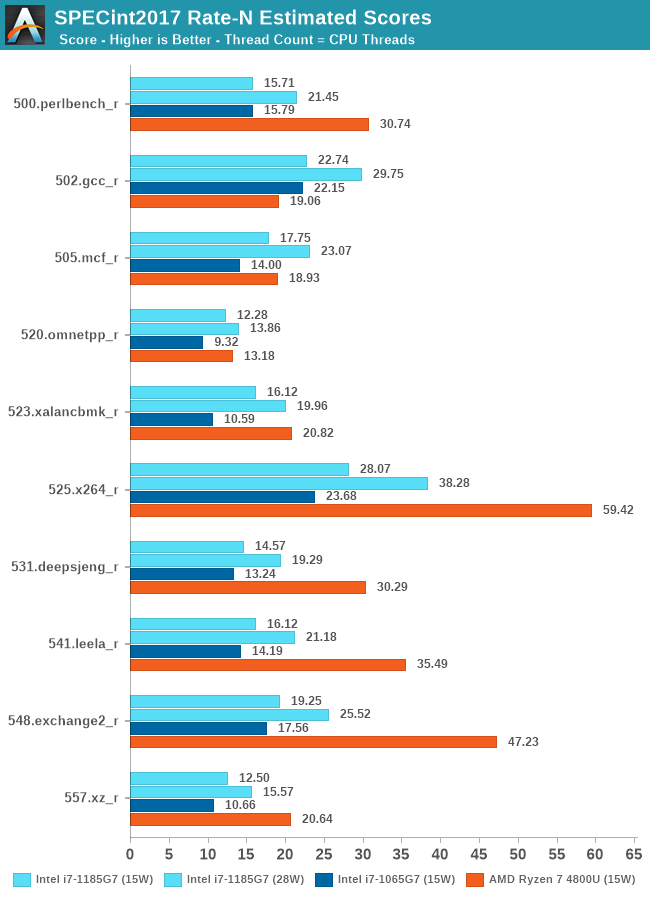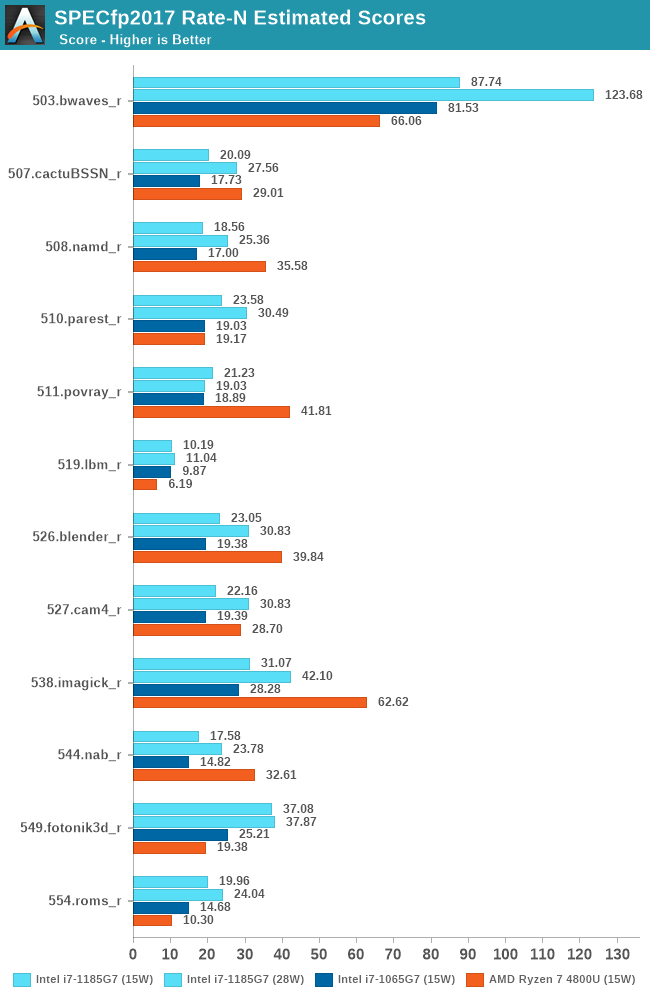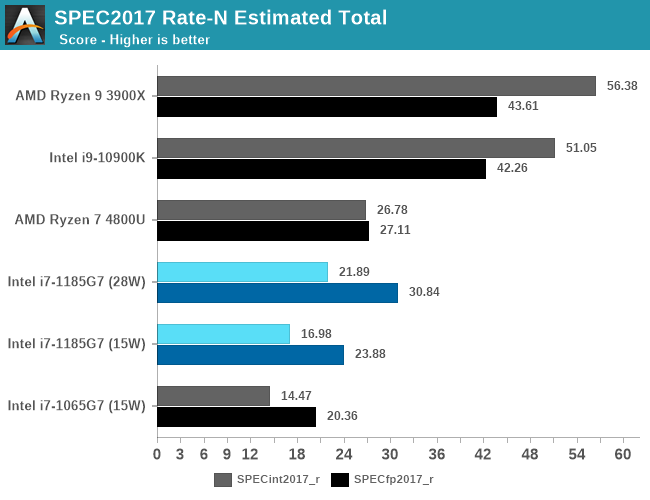Intel’s Tiger Lake 11th Gen Core i7-1185G7 Review and Deep Dive: Baskin’ for the Exotic
by Dr. Ian Cutress & Andrei Frumusanu on September 17, 2020 9:35 AM EST- Posted in
- CPUs
- Intel
- 10nm
- Tiger Lake
- Xe-LP
- Willow Cove
- SuperFin
- 11th Gen
- i7-1185G7
- Tiger King
Section by Andrei Frumusanu
CPU MT Performance: SPEC 2006, SPEC 2017
We’ve noted the earlier discussions of Intel’s TDP handling and how Tiger Lake has 15W and 28W operating modes, and where this comes into play the most is in multi-threaded scenarios where the platform is generally power envelope limited, having to otherwise clock down.
We’re showcasing the MT performance in SPEC for both the Tiger Lake modes, comparing it to both the 15W Ice Lake and AMD Renoir chips. As a note, the 15W Ice Lake platform had a sustained power draw of 18W which makes things not quite as apples-to-apples. Also as a reminder, the Intel systems have 4 cores and are running 8 thread instances, while the AMD system has 8 cores and is running 16 threads.

At first glance, the Tiger Lake system performs quite well versus its predecessor, but that’s mostly only in the 28W mode. At 15W, the generational boost, while it is there, isn’t that significant. This might point out that efficiency isn’t all that much better this generation.
AMD’s platform scales incredibly well in execution-bound workloads as it fully takes advantage of double the core count. In more memory-heavy workloads, the Zen2 cores here seem to be lacking sufficient resources and scale below the performance of Intel’s 4-core designs in some workloads.

In the floating-point results, it’s again a matter of TDP headroom as well as memory performance scalability. In the 15W results, the Tiger Lake chip posts rather small improvements over its Ice Lake counterpart, whilst in the 28W mode the gains are more considerable and even manages to outperform the AMD system more often than not.

In the overall scores, the verdict on Tiger Lake is dependent on how you evaluate Intel’s performance gains. At an (semi)equal-TDP level between Tiger Lake and Ice Lake, the improvements in performance are 17%. Intel does reach a larger 51% generational performance boost in its 28W configuration, but at that point we’re talking about quite different cooling solutions inside of a laptop, no longer making this a valid apples-to-apples comparison.
We haven’t had opportunity to test out higher TDP -HS model of Renoir yet, but with the 15W 4800U already mostly tied with the 28W i7-1185G7, we would expect it to notably outperform the Tiger Lake chip.
Overall, Tiger Lake seems to be offering roughly 20% better performance per watt over its predecessor, with increased performance beyond that coming at a cost of higher power consumption.










253 Comments
View All Comments
blppt - Friday, September 18, 2020 - link
Yeah, we can extrapolate such things if power consumption and heat dissipation are of no relevance to AMD. You're leaving out other factors that go into building a top line GPU.AnarchoPrimitiv - Saturday, September 26, 2020 - link
Power? It will certainly be better than Ampere which is awful at efficiency... Are you forgetting that RDNA2 will be on an improved 7nm node, meaning a better 7nm node that RDNA2?Spunjji - Friday, September 18, 2020 - link
Big Navi probably won't clock that high for TDP reasons, but the people who are buying that it's only going to have 2080Ti performance are in for a rude surprise. It should compete solidly with the 3080, and I'm betting at a lower TDP. We'll see.blppt - Saturday, September 19, 2020 - link
Its been AMD's modus operandi for a long time now. Introduce new card, and either because of inferior tech (occasionally) or drivers (mostly), it usually ends up matching Nvidia's last gen flagship. Although also at a lower price.Considering the leaked benches we've already seen, Big Navi appears to be more of the same. Around 2080Ti performance, probably at a much lower price, though.
Spunjji - Saturday, September 19, 2020 - link
@blppt - not sure if you're shilling or credulous, but there's no indication that those leaked benchmarks are "Big Navi". Based on the probable specs vs. the known performance of the 3080, it's extremely unlikely that it will significantly underperform the 3080. It's entirely possible that it will perform similarly at lower power levels. They're also specifically holding back the launch to work on software.In other words: assuming AMD will keep doing the same thing over and over when they already stopped doing that (see: RDNA, Zen 2, Renoir) is not a solid bet.
But none of this is relevant here. It's amazing how far shills will go to poison the well in off-topic posts.
blppt - Sunday, September 20, 2020 - link
Considering that the 2080ti itself doesn't "significantly underperform the 3080", Big Navi being in line with the 2080ti doesn't qualify it as getting pummeled by the 3080.blppt - Sunday, September 20, 2020 - link
Oh, and BTW, I am not a shill for Nvidia. I've owned many AMD cards and cpus over the years, and they have been this way for a while. I keep wishing they'll release a true high end card, but they always end up matching Nvidia's previous gen flagship.Witness the disappointing 5700XT in my machine at the moment. Due to AMD's lesser driver team, it often is less consistent in games then my now ancient 1080ti. Even in its ideal situation with well optimized drivers in a game that favors AMD cards, it just barely outperforms that old 1080ti. Most of the time its around 1080 performance.
Actually, YOU are the shill for AMD if you keep denying this is the way they have been for a while.
"In other words: assuming AMD will keep doing the same thing over and over when they already stopped doing that (see: RDNA, Zen 2, Renoir) is not a solid bet."
Except---they STILL don't hit the top of the charts in games on their CPUs. Zen/Zen 2 is a massive improvement, and dominates Intel in anything highly multi-core optimized, but that almost always never applies to games.
So, going to a Zen comparison for what you think Big Navi will do is not a particularly good analogy.
Spunjji - Sunday, September 20, 2020 - link
@blppt - "I'm not the shill, you're the shill, I totally own this product, let me whine about how disappointing it is though, even though performance characteristics were clear from the leaks and it still outperformed them. I bought it to replace a far more expensive card that it doesn't outperform". Okay buddy, sure. Whatever you say. 🙄I didn't say it would take the performance lead. Going for a Zen comparison is exactly what I meant and I stand by it. We will see, until benchmarks come out it's all just talk anyway - just some of it's more obvious nonsense than the rest...
blppt - Sunday, September 20, 2020 - link
@SpunjiThat was the dumbest counter argument I've ever heard.
First off, I didn't buy it to 'replace' anything. The 1080ti is in one of my other boxes. Where did you get 'replace' from? The 5700XT was to complete an all-AMD rig consisting of a 3900X and and AMD video card.
Secondly, the 1080ti is now almost 4 freaking years old. You bet your rear end I'd expect it to outperform a top end card from almost 4 years ago, when it is currently STILL the best gpu AMD offers.
And finally, I have over 20 years experience with both AMD cpus and gpus in various builds of mine, so don't give me that "bought one AMD product and decided they stink" B.S.
I've been on both sides of the aisle. Don't try and tell me i'm a shill for Nvidia. I've spent way too much time and money around AMD systems for that to be true.
AnarchoPrimitiv - Saturday, September 26, 2020 - link
You're a liar, I'm so sick of Nvidia fans lying about owning AMD cards